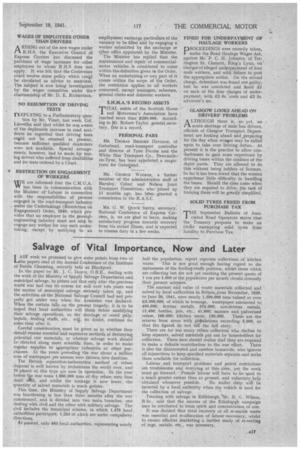Salvage of Vital Importance, Now and Lat e r L AST week we
Page 19

If you've noticed an error in this article please click here to report it so we can fix it.
promise,cl to give some points from two of the papers read at the Annual Conference of the Institute of Public Cleansing, recently held at Blackpool.
In the paper by Mr. J. C. Dawes, 0.B.E., dealing with the work of the Ministry of SppplY. Salvage Department and, municipal salvage, he points out that only after the previous world war had run its course for well over two years was the matter of municipal salvage seriously taken up, and the activities of, the National Salvage Council had not properly got under way when the Armistice was declared. When the curtain falls on the present tragedy, it is to be hoped that local authorities will think before modifying their salvage operations, as the' shortage of wood pulp, 'metals, feeding stuff& etc., no doubt, continue for some time after it.
Careful consideration must be given as to whether they should resume wasteful, and expensive methods of destroying potential raw materials, or whether salvage work should be directed along more scientific lines, in order to make regular supplies to appropriate industries or other purchasers. In the years preceding the war about a million tons of wastepaper per annum were thrown into dustbins.
The British separation-incineration method of refuse disposal is well known by technicians the world over, and 70 plants of this type are now in operation. In the year before tke war some 1,600,000 tons of dry refuse, were thus dealt w,h, and whilst the tonnage is now lower, the quantity of salved materials is much grdater.
This time, the Ministry of Supply Salvage Department was functioning in less than three months after the war commenced, and is divided into two main. branches, one dealing with civil and the other with military salvage. The civil includes the municipal scheme, in which 1,479 local authotities participate, 1,253 of which are under compulsory. directions. At present, only 463 local .authorities, representing nearly half the population, report separate collections of kitchen waste. This is not good enough having regard to the seriousness of the feeding-stuffs position, whilst those which are collecting but are not yet reaching the present quota of 1 ton per 1,000 of the population per month should intensify theiryresent schemes. The amount aid value of waste materials collected and salved by local authorities in Britain„from November, 1939, to June 30, 1941, were nearly 1,500,000 tons valued at over £3,300,000, of which in tonnage, wastepaper amounted to 400,000; ferrous metals, 374,000; non-ferrous metals, 15,400; bottles, jars, etc., 41,000; manure and pulverized refuse, 168,000; kitchen waste, 126,000. These are the returns from areas with populations exceeding 5,000, so that the figure g do not tell the full story.
There are far too many refuse collectors who decline to keep separate, salved materials put out by householders for collection. These men should realize that they are required to make a definite contribution to the war effort. There is also the disinterested and careless housewife, who ignores allinjunctions to keep specified materials separate and make them available for collection.
Labour and transport problems and petrol restrictions are troublesome and worrying at this time, yet the work must go forward.Female labour will have to -be nsed to a much greater extent than at present, and voluntary.help ' obtained whenever possible. No trailer duty will be incurred by a local authority when the vehicle is used for the collection of salvage. Treating with salvage in Edffiburgh, 'Mr. N. G. Wilson, B.Sc., said that the success of the Edinbargh campaign may be attributed to team spirit arid concentration of aim. It was decided that total recovery of all re-usable waste. was essential and re-allocation of labour -necessary, whilst to ensure efficient marketing a further study Of re-sorting of rags, metals, etc., was necessary.




















































